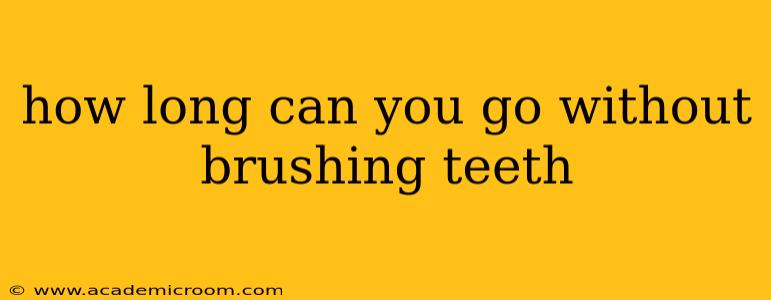How Long Can You Go Without Brushing Your Teeth?
The simple answer is: you shouldn't go more than 24 hours without brushing your teeth. While you might not experience immediate, drastic consequences, skipping brushing even for a day allows harmful bacteria to flourish in your mouth, leading to a range of oral health problems. Let's delve deeper into the specifics.
What Happens When You Don't Brush Your Teeth?
When you eat, food particles get trapped between your teeth and along your gum line. These food remnants are a feast for bacteria, which produce acids as they break down the sugars. These acids attack your tooth enamel, leading to demineralization—the weakening and eventual breakdown of the tooth's protective outer layer. This process, if left unchecked, leads to cavities (dental caries).
Beyond cavities, neglecting oral hygiene can also lead to:
- Gingivitis: This is the early stage of gum disease, characterized by inflammation, redness, swelling, and bleeding gums.
- Periodontitis: If gingivitis is left untreated, it can progress to periodontitis, a more severe form of gum disease that can damage the soft tissues and bone supporting your teeth, potentially leading to tooth loss.
- Bad breath (halitosis): Bacteria produce volatile sulfur compounds that cause unpleasant odors. Neglecting brushing allows these bacteria to thrive, resulting in persistent bad breath.
- Increased risk of infections: Poor oral hygiene can increase your risk of developing oral infections like gingivitis, periodontitis, and even oral thrush.
How Long Before You See Problems?
The timeline for developing oral health problems from neglecting brushing depends on various factors including:
- Your individual oral health: Some individuals are more susceptible to cavities and gum disease than others.
- Your diet: A diet high in sugary and acidic foods will accelerate the damage caused by bacteria.
- Your saliva production: Saliva helps neutralize acids and clean your mouth. Reduced saliva production can increase your risk of problems.
While some might experience noticeable symptoms within a few days of neglecting brushing, others might not see significant issues for a couple of weeks. However, the cumulative effect of consistently poor oral hygiene is always detrimental.
What About the "People Also Ask" Questions?
Here are some frequently asked questions regarding brushing frequency and oral hygiene:
What are the consequences of not brushing your teeth for a week?
After a week of not brushing, you'll likely experience significant consequences. You’ll probably have noticeable bad breath, swollen and bleeding gums (gingivitis), and possibly even the beginnings of cavities. The bacterial build-up will be considerable, making it more difficult to reverse the damage.
What happens if you don't brush your teeth for a month?
A month without brushing is a serious issue. At this point, you'll likely experience severe gingivitis, potentially periodontitis, multiple cavities, and a significant increase in your risk of various oral infections. Professional dental intervention will almost certainly be necessary.
Is it okay to skip brushing once in a while?
While occasional lapses are less damaging than prolonged neglect, consistent brushing twice daily is crucial for maintaining good oral health. Skipping brushing regularly increases your risk of dental problems significantly.
How often should you brush your teeth?
The recommendation from dental professionals is to brush your teeth twice a day, for at least two minutes each time, using fluoride toothpaste.
Can you get away with just rinsing your mouth with water?
Rinsing with water can help remove some food particles, but it's not a substitute for brushing. Brushing is essential to remove plaque and bacteria from the tooth surfaces and along the gum line.
Conclusion:
Maintaining good oral hygiene is vital for overall health. While the exact timeline for experiencing problems from not brushing varies, it’s clear that consistent brushing is crucial for preventing cavities, gum disease, and other oral health issues. Aim for twice-daily brushing, and schedule regular dental check-ups to maintain optimal oral health.
